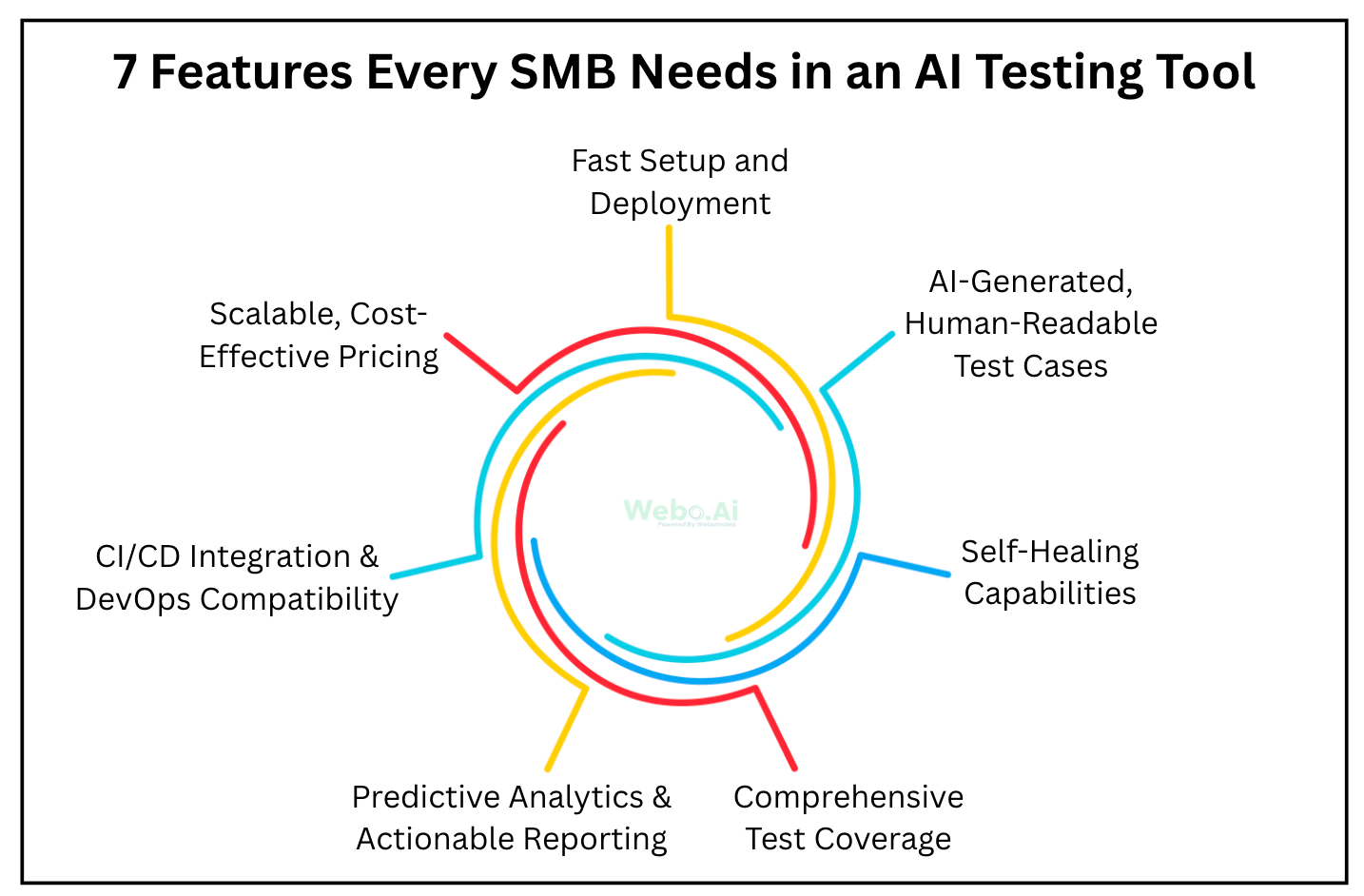7 Key Features to Look for in AI Test Automation Tools for SMBs

Published on May 19, 2025
Introduction
For small and mid-sized businesses, the pressure to ship faster without compromising quality is relentless. Manual testing just can’t keep up- and traditional automation often brings its own overhead.
That’s where AI-powered test automation tools come in.
But not all platforms are created equal. The right tool for SMBs needs to offer more than buzzwords. It should be fast, adaptable, and easy to integrate into your workflow without draining your budget or requiring a team of engineers to manage.
7 Features Every SMB Needs in an AI Testing Tool

1. Fast Setup and Deployment
SMBs often don’t have weeks- or even days- to implement a new tool. A good AI test automation solution should be up and running quickly with minimal configuration or infrastructure setup.
Look for a platform that can be installed or accessed via the cloud with little to no manual effort. Bonus points if it doesn’t require deep technical onboarding. The tool should let you upload your app or connect your environment and start generating results the same day.
Why it matters: Time spent on setup is time lost on actual testing. For lean teams, ease of deployment can make or break adoption.
2. AI-Generated, Human-Readable Test Cases
One of the biggest benefits of AI in testing is the ability to generate test cases automatically. But it's not just about automation- it's about quality and clarity.
The best AI tools don’t spit out cryptic scripts. They create test scenarios that mirror real user behavior and are readable by both developers and non-technical stakeholders. These should include logical flows, edge cases, and variations that are often missed in manual testing.
Why it matters: Automatically generated test cases save time, reduce errors, and allow teams to scale testing without scaling headcount.
3. Self-Healing Capabilities
Applications evolve fast. A minor UI change can break dozens of automated test scripts. If you have to manually maintain those scripts every time something shifts, you're losing the core benefit of automation.
Self-healing AI testing tools detect changes in the application and intelligently update test cases or element locators without human intervention. They "learn" how your app behaves and adjust accordingly.
Why it matters: This drastically reduces maintenance time and ensures your test suite remains stable even as your product changes.
4. Comprehensive Test Coverage
A strong AI test automation tool doesn’t just focus on the happy path- it aims for full coverage. That includes functional testing, regression testing, negative test scenarios, and exploratory paths that real users might take.
The tool should simulate a variety of user interactions across your application's workflows, ensuring you catch bugs early. The more intelligent the coverage, the fewer surprises you’ll face after release.
Why it matters: More coverage = fewer bugs in production. Especially for SMBs without large QA teams, broad automated coverage is essential.
5.Predictive Analytics and Actionable Reporting
It’s not enough to know that something broke. You need to know why it broke, how often it happens, and what the likely impact is.
AI-powered tools should offer dashboards that go beyond pass/fail stats. Look for predictive analytics, root cause analysis, and trend reporting that can inform development priorities.
Some platforms can even flag high-risk areas of your app before failures occur, giving you time to address them proactively.
Why it matters: Actionable insights help teams prioritize fixes and continuously improve product quality, even with limited resources.
6. CI/CD Integration and DevOps Compatibilit
If your AI testing tool doesn’t integrate with your current dev stack, it’s a bottleneck waiting to happen. A solid platform should plug into your CI/CD pipelines like Jenkins, GitHub Actions, GitLab CI, etc. and work with your version control, issue tracking, and deployment tools.
Testing should be triggered automatically with every code commit, build, or deployment- no manual steps required.
Why it matters: Continuous integration and delivery demand continuous testing. Seamless integration ensures your automation works in sync with your development process.
7. Scalable, Cost-Effective Pricing
SMBs are often priced out of enterprise-grade tools. The best platforms offer flexible pricing that reflects usage, team size, or testing volume- without locking you into long-term contracts.
You shouldn’t need to pay for features you don’t use or scale to enterprise tiers just to get reliable performance. Freemium or trial-based access is also a plus, especially when evaluating options.
Why it matters: Budget constraints are real for SMBs. The ROI on your testing tool should be clear and measurable.
Final Thoughts: Why Webo.Ai Is Worth Considering
If you're searching for an AI test automation platform that ticks all these boxes, Webo.Ai is a strong contender. It’s built with speed, scalability, and simplicity in mind- making it a practical solution for SMBs looking to modernize their QA process.
Webo.Ai combines rapid setup, AI-driven test generation, and patented self-healing technology with predictive analytics and full CI/CD integration. It’s cost-effective, easy to use, and powerful enough to handle complex testing workflows without overwhelming your team.
In short, it helps small teams test like enterprise pros- without the overhead.Want to see how it works in your environment? Start a free trial at Webo.Ai and take it for a spin.
